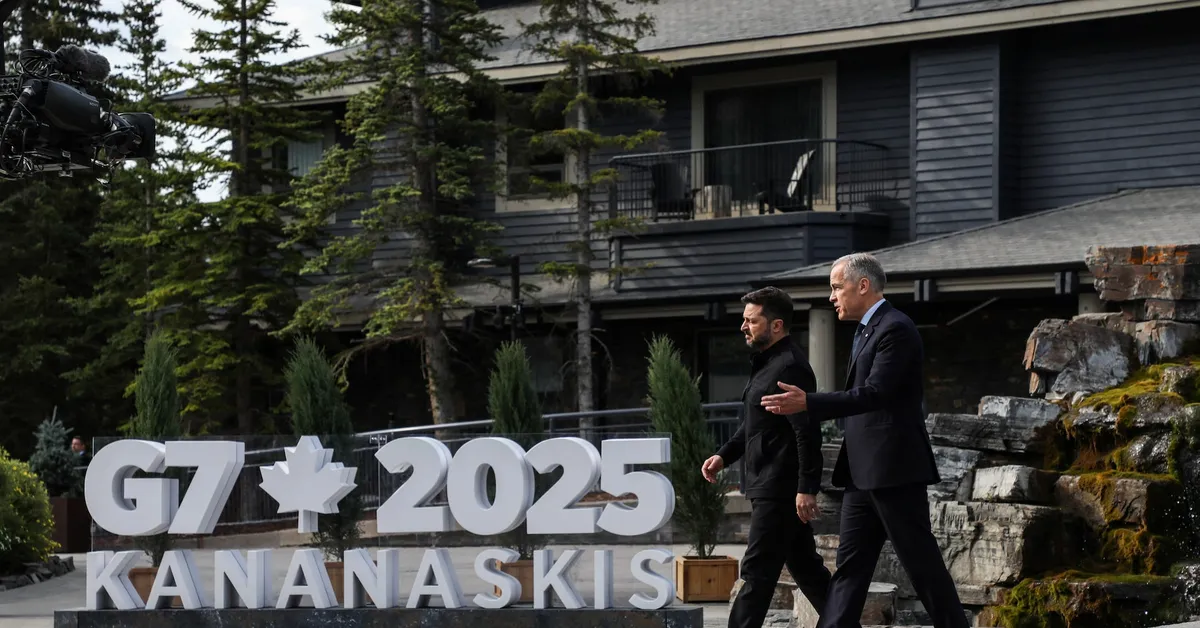
On June 17, 2023, Ukrainian President Volodymyr Zelenskiy arrived in Canada to appeal to the Group of Seven (G7) nations for increased support in the ongoing conflict against Russia. His visit comes at a time when U.S. President Donald Trump departed the summit early due to emerging situations in the Middle East.
The G7, comprised of some of the world's wealthiest nations, has faced challenges in maintaining a unified stance on pressing issues, particularly regarding conflicts in Ukraine and the Middle East. Trump's recent support for Russian President Vladimir Putin and his imposition of tariffs on several allies have further complicated matters.
During his visit, Zelenskiy met with Canadian Prime Minister Mark Carney, who announced that Canada would provide an additional C$2 billion (approximately $1.47 billion) in military assistance to Ukraine, along with new financial sanctions against Russia. This announcement followed a tragic overnight attack in Kyiv that claimed the lives of 12 individuals, emphasizing the necessity of international solidarity with Ukraine.
Prime Minister Carney noted that during a dinner meeting on Monday, G7 leaders reiterated the importance of exerting maximum pressure on Russia to initiate serious peace talks. Zelenskiy responded, stating, “We are ready for peace negotiations and an unconditional ceasefire, but for this, we need pressure.”
As one of Ukraine's staunchest allies, Canada plays a vital role in supporting Kyiv; however, its capacity to aid Ukraine is limited compared to the United States, the largest arms supplier. Zelenskiy expressed his hope to engage Trump in discussions regarding the procurement of additional weaponry.
Trump's decision to leave the summit early stemmed from escalating tensions in the Middle East, particularly between Iran and Israel. He later clarified that his departure was not related to ceasefire negotiations, despite comments from French President Emmanuel Macron suggesting otherwise.
A European Union diplomat revealed that remaining G7 members were eager to meet with Zelenskiy to continue discussions. Trump did agree to a group statement that called for resolution in the ongoing Israel-Iran conflict, urging that a resolution to the Iranian crisis could lead to a broader de-escalation of hostilities in the region.
In the days leading up to the summit, Zelenskiy indicated his intent to discuss ongoing support for Ukraine, sanctions against Russia, and future financing for Kyiv's reconstruction efforts. Macron emphasized the collective resolve necessary to exert further sanctions against Russia to pave the way for peace.
A European official reported that there was a consensus among G7 nations, including the U.S., to increase pressure on Russia for a ceasefire, although the proposal to lower the price cap on Russian oil had been abandoned due to rising prices. Trump also expressed that the G7 had made a mistake in expelling Russia from the then-Group of Eight following its occupation of Crimea in 2014.
As G7 leaders prepared several draft documents covering various topics, including migration, artificial intelligence, and critical minerals, none had received approval from the United States. The absence of Trump raises questions about the possibility of any formal declarations being made.
In an effort to strengthen international alliances, Carney extended invitations to non-G7 nations, including Mexico, India, Australia, South Africa, South Korea, and Brazil, aiming to diversify Canada’s exports beyond the United States.
As the situation develops, the international community watches closely for further actions and commitments from the G7 in support of Ukraine and in addressing the complexities of global conflicts.